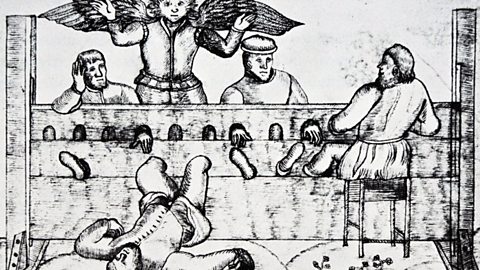Avoiding punishment
Given how terrible punishments could be in the medieval period, it is not surprising that people who had been accused of serious crimes tried a wide range of methods to avoid death.

Avoiding trial
Becoming an outlaw
If they outran the hue and cryA method of raising the alarm to the rest of the village after a crime had been committed, usually by shouting loudly. criminals might have tried their luck with an outlaw gang living in a forest.
Seeking sanctuary
Religious houses offered safety and protection from the law to criminals who were on the run. Force was not allowed to be used on Church grounds, even by the sheriffThe monarchâs chief law enforcer in each county. The criminal then had up to 40 days and 40 nights to leave England forever before the Churchâs protection expired.
Using powerful friends
If the criminal had powerful connections, such as the local lord, this could help them to get the charges dismissed and avoid a trial.
Refusing to plead
Criminals who refused to submit a plea of either âguiltyâ or ânot guiltyâ were sent back to gaol. However, they were fed mouldy bready and water and would probably have experienced a slow and unpleasant death anyway.
Avoiding conviction
Many juryA group of people (usually 12 in number) who listen to the facts of a case in a court and give their verdict. at the assizes often found the defendant ânot guiltyâ in cases where they felt sympathy for the accused. They were likely to know the person and might have tried to help if they believed the crime had been carried out in desperation. This was especially the case when women were on trial.
Avoiding execution
Buying a pardon
If the guilty person was incredibly wealthy, they might have been able to buy a pardon from the king.
Joining the king's army
If the country was at war, kings often chose to pardon criminals and outlaws if they agreed to join the army.
Pregnancy
Women who were pregnant would have their execution postponed. Their sentence was often reduced to a fine.
Benefit of the clergy
Priests could be put on trial in the assizes. However, only the Church was allowed to punish them, and the Church did not execute people. This was known as the benefit of clergy.
As a result, some criminals tried to claim that they were priests in order to avoid the death penalty. After 1351, they were required to read aloud a certain verse from the Bible to prove that they were churchmen (women could not claim benefit of clergy because they could not become priests). The verse became known as the neck verse because it was a way to avoid being hanged. Some criminals learned the verse off by heart, even if they couldnât read, just in case they needed it.
Turning kingâs approver
If a criminal gave evidence against other criminals, and those others went on to be convicted, the original criminal would be let off if they agreed to move abroad and live in exileWhen someone is away from their home country and is refused permission to return.